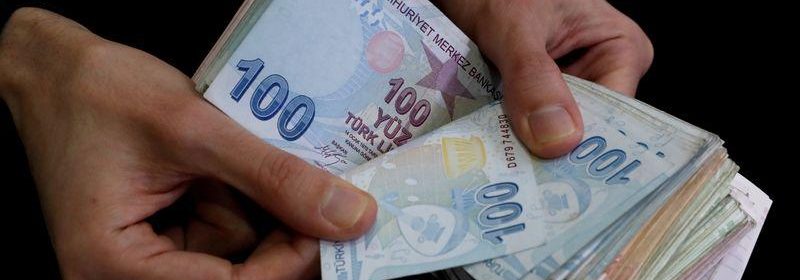Lira nears record low after rate cut sets Turkey on uncertain path

ANKARA (Reuters) – Turkey’s lira edged close to its all-time low on Friday, driven by fleeing foreign investors but mitigated by local bargain hunting, a day after the central bank unexpectedly cut its policy rate and gave little hint of how low it could go.
The currency – prone to sharp swings and an emerging-markets laggard for several years now – weakened 0.7% to 8.82 versus the dollar by 0949 GMT.
It earlier touched 8.86, near its low of 8.880 set in June.
The lira dove on Thursday when the bank slashed its key rate by 100 basis points to 18% despite high inflation, delivering stimulus long sought by President Tayyip Erdogan and reinforcing analysts’ worries over political interference.
The currency’s three-month volatility gauge spiked to its highest since June, while the country’s dollar-denominated bonds fell to their lowest since April as the lira declined, according to Tradeweb data.
The central bank provided little guidance on the future path of policy, yet Societe Generale, Barclays, JPMorgan, and Goldman Sachs all said they expect more rate cuts in coming months.
Still, after a years-long exodus of foreign funds from Turkish assets, the lira’s fate is largely in the hands of local businesses, investors and savers.
Turks’ forex and gold holdings have steadily risen in recent years to hit a record above $238 billion this month, as locals hedged their savings against double-digit inflation and the ailing lira.
OPPORTUNITY SALES
Traders said sales of dollars and other hard currencies by Turks limited the lira depreciation on Thursday, when corporates and individuals sold $1-$2 billion according to four traders.
“The central bank’s decision, which was unexpected for some, put the lira under serious selling pressure. But seeing it as an opportunity, locals’ forex sales of at least $1 billion was the main factor limiting the losses,” said a trader who requested anonymity.
If the bank continues to cut rates, it will either need to eventually raise rates again to protect the lira or state banks and government institutions will need to intervene, the trader said. “This is why the rate of the cuts from now on will be determinant for the lira.”
Turks who bought dollars a year ago booked a 15% profit, traders noted. Locals also bought lira in March when it plunged after Erdogan fired a hawkish central bank chief and installed Sahap Kavcioglu as governor.
Kavcioglu began giving dovish signals early this month, but few economists polled by Reuters had expected Thursday’s move given inflation hit 19.25% in August.
Foreign investors hold just over 5% of Turkish government bonds, down from more than 20% five years ago. That slide is largely due to double-digit inflation and worries over central bank credibility. Erdogan ousted the central bank’s last three governors over a 20-month span due to policy disagreements.
Phoenix Kalen, strategist at Societe Generale, predicted a gradual lira depreciation given Turkish retail investors are sceptical about the central bank’s willingness to reduce inflation to a 5% target.
“Retail flows now largely determine the course of the currency, not international market participants,” she wrote. “It comes down to a question of public confidence and how fast that picture might deteriorate.”
Source: Read Full Article
